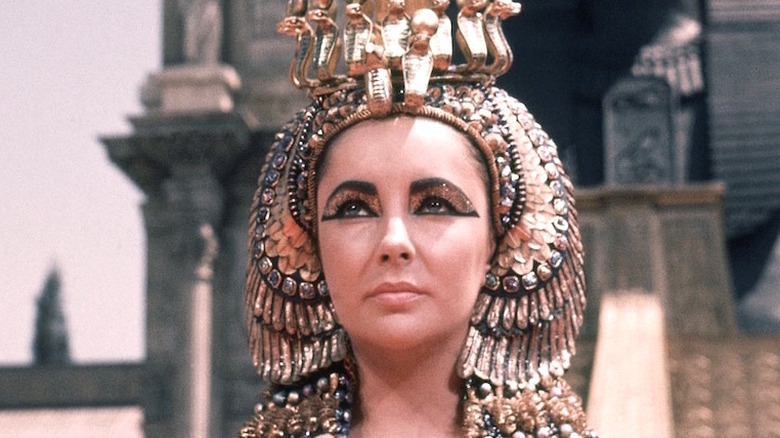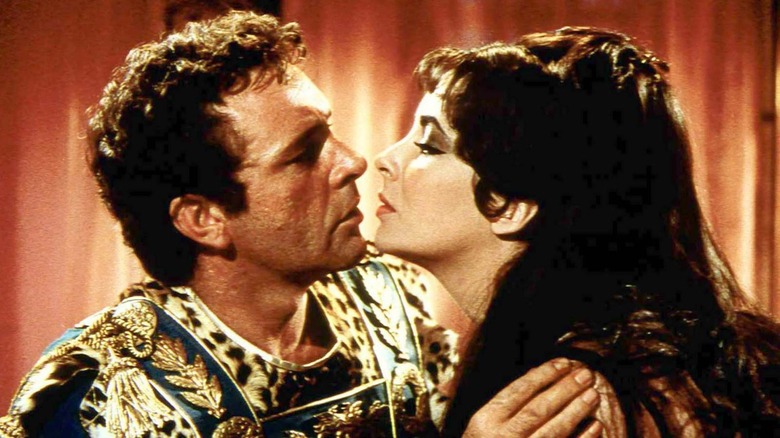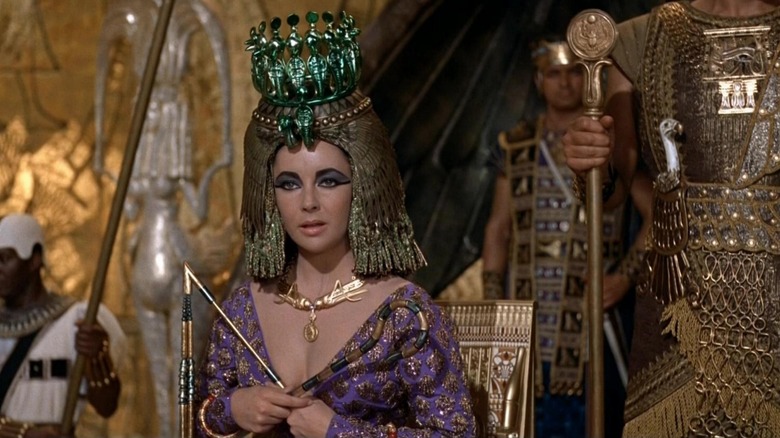How 1963's Cleopatra Nearly Ruined 20th Century Fox
Historians describe the Egyptian queen Cleopatra as "a woman of surpassing beauty." Who better to star in the 1963 film's titular role than Elizabeth Taylor, one of the most stunning starlets of Old Hollywood? While there have been rumors of "Cleopatra" remakes from directors like David Fincher or Denis Villeneuve, as well as a recent rumor of a version from the "Wonder Woman" team Patty Jenkins and Gal Gadot, none can match what /Film writer Ben Pearson calls a "tremendous piece of old-school filmmaking that exemplifies the type of opulent excesses that pervaded the Old Hollywood era."
Joseph L. Mankiewicz's historical drama was a lavish take on the Queen of the Nile's leadership and love life. However, not even the most beautiful actress in the world nor the most sumptuous production design and costumes could save the 20th Century Fox vehicle "Cleopatra" from nearly closing the studio's doors. The making of the film was rife with controversy and conflict.
There Were Off-Screen Setbacks and Scandals
The production of "Cleopatra" immediately got off to a bad start in 1961 when Taylor came down with pneumonia. The studio was forced to shut down filming and moved to Rome, burning millions of dollars on unused footage and new sets in the process. Not only was there a change in location but also in cast and crew: Joseph L. Mankiewicz replaced Rouben Mamoulian as director and Richard Burton was cast at Mark Antony, discharging Stephen Boyd.
Burton's casting was serendipitous — he began a scandalous love affair with Taylor that broke up their respective marriages and became explosive fodder for the tabloids. Burton and Taylor would go on to stay together 13 years and collaborate on 11 films, but Tom Mankiewicz (son of director John L. Mankiewicz) believes the news of their initial adultery overshadowed the artistic merits and reception of "Cleopatra." He told the Los Angeles Times that the film was "very underrated because at the time it came out, every critic was lying in wait for it. It was the 'Waterworld' of its day, and, especially with the celebrity and the romance, most critics were rubbing their hands together waiting to see how badly they could cut it."
The Budget Got Too Big
At the time, "Cleopatra" was the most expensive film ever made. Although the amount pales in comparison to the budgets of modern blockbusters, its $42 million budget would surpass $200 million today after inflation, the Los Angeles Times reports. The documentary "Cleopatra: The Film That Changed Hollywood" chronicles the film's behind-the-scenes chaos. Mankiewicz was pushed to the brink because of the "spiraling budget" and had to write at night and shoot during the day, leading to immense confusion about the schedule. Publicist Jack Brodsky, who is interviewed in the documentary, grimly notes, "This is the only movie I ever worked on where you didn't know what was going to be shot until you got on the set."
Another aspect of the overblown budget is the film's length; Mankiewicz's original cut was nearly five hours long. Such an ambitious undertaking led to more shooting time and more money spent. As the budget escalated, the studio almost went bankrupt, selling off nearly 300 acres of its backlot to stay in business (per the Los Angeles Times).
Was it all worth it? Although it went on to win four Academy Awards, popular culture largely regards "Cleopatra" as a critical misstep. Kevin Burns, co-director of "Cleopatra: The Film That Changed Hollywood," defended the Hollywood romance in the Times: "The film was not a bad film. It was not a flop. It was too expensive. It was a financial mess, but it made $24 million in its initial release. It was one of the top 10 grossing films of the '60s. It was by no means a failure on any level. It is one of the most beautiful films ever shot. It has some incredible performances. It is very intelligently written and deserves to be seen."
Before any remakes are released, we should revisit this extravagant piece of filmmaking that, for better or worse, transformed the Hollywood landscape by giving audiences a grand epic unlike any other.


